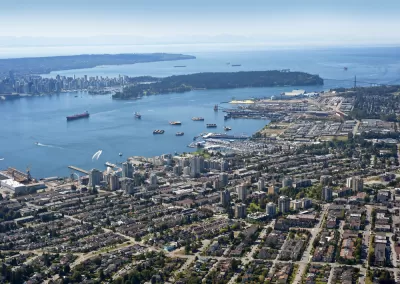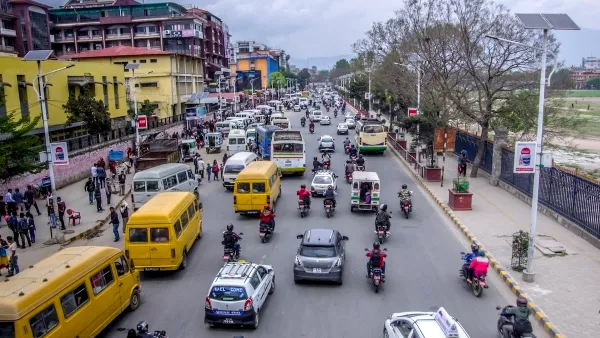Four months after formally recognizing climate change as an emergency, the Vancouver City Council considers six large-scale changes to dramatically reduce city-wide carbon emissions.

With sights set on carbon neutrality before the year 2050, engineering and planning staff from Vancouver asked city council members for concessions that, if allowed, would dramatically reduce the city’s carbon footprint. These asks, taking the form of six general goals, have the potential to make an unprecedented impact, Susan Lazaruk reports: the “[p]lan would work out to 90,000 [tons] a year in a reduction of carbon, compared to 19,000 [tons] a year the city has reduced between 2007 and 2017.”
A drastic shift in emissions could be made possible by sweeping and impactful changes in the way the city functions, which is exactly what city officials have in mind. Their goals generally fall into two categories: changes in patterns of transportation and large scale infrastructural (or environmental) revamps.
Lazaruk summarizes their six "big moves" as follow:
- Aim to have 90 per cent of its citizens live within an easy walk of their "daily needs."
- Accelerate its goal of having two-third of trips in the city by walking, biking or transit by 2030 (instead of 2040).
- Have 50 per cent of all kilometres driven on city roads by zero emissions vehicles.
- Aim by 2025 to have all new and replacement heating and hot water systems in buildings produce zero emissions.
- By 2030 reduce the carbon content of new buildings and construction projects by 40 per cent (compared to 2018).
- By 2030 restore enough forest and coastal ecosystems in the city to remove one million tonnes of carbon pollution every year by 2060.
The report also included a list of 53 smaller, more immediately actionable items to be accomplished by 2050. The city of Vancouver’s short-term plans are promising too, shares Lazaurk. "The city is also aiming to phase out fossil fuels by 2023 by switching its non-emergency fleet sedans to zero emission vehicles and its mowers and leaf blowers to electric or zero emissions technologies." At this time, the city of Vancouver is working to create a carbon budget and establish a working group dedicated to climate and equity.
FULL STORY: City of Vancouver to consider six 'big moves' in response to climate emergency

Planetizen Federal Action Tracker
A weekly monitor of how Trump’s orders and actions are impacting planners and planning in America.

Maui's Vacation Rental Debate Turns Ugly
Verbal attacks, misinformation campaigns and fistfights plague a high-stakes debate to convert thousands of vacation rentals into long-term housing.

Restaurant Patios Were a Pandemic Win — Why Were They so Hard to Keep?
Social distancing requirements and changes in travel patterns prompted cities to pilot new uses for street and sidewalk space. Then it got complicated.

In California Battle of Housing vs. Environment, Housing Just Won
A new state law significantly limits the power of CEQA, an environmental review law that served as a powerful tool for blocking new development.

Boulder Eliminates Parking Minimums Citywide
Officials estimate the cost of building a single underground parking space at up to $100,000.

Orange County, Florida Adopts Largest US “Sprawl Repair” Code
The ‘Orange Code’ seeks to rectify decades of sprawl-inducing, car-oriented development.
Urban Design for Planners 1: Software Tools
This six-course series explores essential urban design concepts using open source software and equips planners with the tools they need to participate fully in the urban design process.
Planning for Universal Design
Learn the tools for implementing Universal Design in planning regulations.
Heyer Gruel & Associates PA
JM Goldson LLC
Custer County Colorado
City of Camden Redevelopment Agency
City of Astoria
Transportation Research & Education Center (TREC) at Portland State University
Jefferson Parish Government
Camden Redevelopment Agency
City of Claremont





























